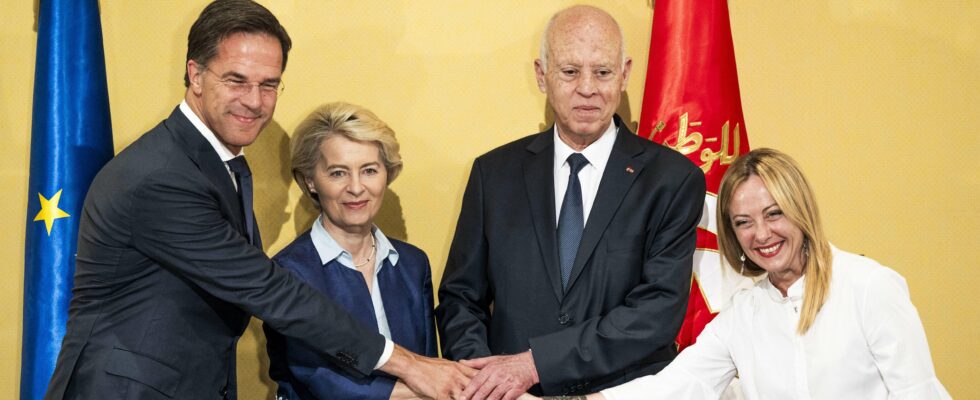Is a presidential election without opposition, without observers or referees still an “election”? Strictly speaking, a plebiscite? But what is a plebiscite when less than 28% of voters went to the polls? In Tunisia, cradle of the Arab Spring, the only country where the democratic experience survived for a time – after the fall of Ben Ali -, voting is once again reduced to a formality. As in neighboring Algeria, where President Abdelmadjid Tebboune has just been re-elected, Kaïs Saïed’s two competing candidates, the only survivors of the purge orchestrated by the authorities, had no chance against the incumbent. Unsurprisingly, Kaïs Saïed therefore returns for a second term, with more than 89% of the votes, according to an exit poll carried out by the Sigma Conseil institute and broadcast by national television Wataniya. The president, a former professor of constitutional law, is following the trajectory of a confirmed autocrat whom he holds in high esteem: Vladimir Putin.
The Independent High Authority for Elections, responsible for organizing the polls in Tunisia, also signed a memorandum of cooperation with the Central Electoral Commission of the Russian Federation last March. What a model! In the Putinist Tunisia of Kaïs Saïed, the manual is respected to the letter. The opponents? “Half are in prison, the other in exile. Those who remain are hares,” estimates Kader Abderrahim, lecturer at Sciences Po. Justice? To orders. Not content with having dissolved the Superior Council of the Judiciary and dismissing dozens of judges, Kaïs Saïed passed a last-minute law, one week before the presidential election, depriving the Administrative Court of its jurisdiction in electoral matters. Preventing it, therefore, from controlling any abuse. As for the electoral commission, it refused accreditation to the observers.
With such “precautions”, the result of the October 6 vote was in little doubt. However, one question remains: who will be offended? The day after the re-election of Algerian President Abdelmadjid Tebboune (with 84% of the votes, according to official results), Emmanuel Macron sent him his “deepest congratulations” and sent his advisor for North Africa and the Middle East, Anne -Claire Legendre, in Algiers. It is a safe bet that the Tunisian democratic confiscation will not move European chancelleries any further. How could it be otherwise, even though the European Union has financially supported Kaïs Saïed since signing a migration pact with him in July 2023?
“Supporting it tarnishes the reputation of the EU”
Under this agreement, the European Commission announced last year aid of 127 million euros to Tunisia so that this state is responsible for retaining candidates for departure to the Old Continent. According to internal documents revealed by the Guardiana significant part of this sum is paid to the Tunisian national guard, accused of widespread sexual violence and torture by dozens of witnesses and several NGOs. The British daily details, in a thorough investigationthese abuses committed against pregnant women, mothers, children. “Highly placed sources in Brussels admit that the EU is ‘aware’ of allegations of abuses against Tunisian security forces, but is turning a blind eye, desperate to outsource the country’s southern border Europe towards Africa, under the leadership of Italy,” states the newspaper.
According to this investigation, the Tunisian maritime national guard would have prevented more than 50,000 people from crossing the Mediterranean this year, using patrol boats financed by the EU, significantly reducing arrivals on Italian coasts. To the point of arousing the interest of other states, notably the British Labor government of Keir Starmer. What happens to these migrants intercepted at sea? Some are taken to the desert near the borders with Libya and Algeria without water or food, the World Organization Against Torture (OMCT) warned last December. Others pile up in the makeshift camp of El Amra, a coastal town located north of Sfax.
“Saïed’s migration policy is based on human rights violations and xenophobic rhetoric, and supporting him tarnishes the reputation of the EU,” said Anthony Dworkin in a note published by the European Council on International Relations. More generally, Saïed’s haphazard policies and his attacks on Tunisian democracy do not serve European interests.” Nor did the dictator Ben Ali in his time… with whom Europe cooperated for so long, with its eyes closed.
.
